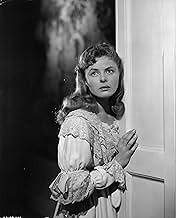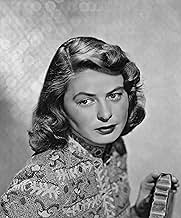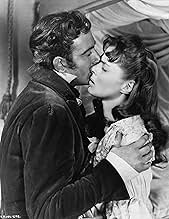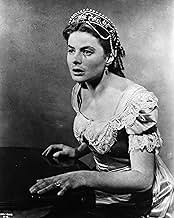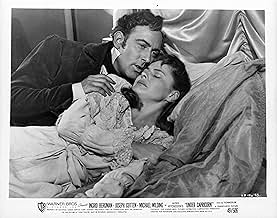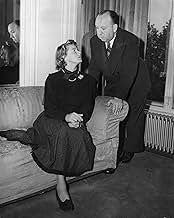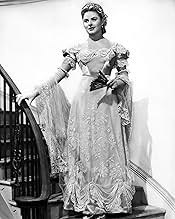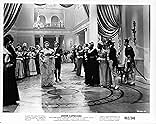Em 1831, Charles Adare viaja à Austrália para recomeçar sua vida. Ao chegar, conhece Sam e descobre que a esposa dele é Henrieta, sua prima. Bela e instável, ela agora é alcoólatra e a reapr... Ler tudoEm 1831, Charles Adare viaja à Austrália para recomeçar sua vida. Ao chegar, conhece Sam e descobre que a esposa dele é Henrieta, sua prima. Bela e instável, ela agora é alcoólatra e a reaproximação de Charles desperta ciúmes em Sam.Em 1831, Charles Adare viaja à Austrália para recomeçar sua vida. Ao chegar, conhece Sam e descobre que a esposa dele é Henrieta, sua prima. Bela e instável, ela agora é alcoólatra e a reaproximação de Charles desperta ciúmes em Sam.
- Direção
- Roteiristas
- Artistas
- Prêmios
- 3 vitórias no total
- Major Wilkins
- (as Francis de Wolff)
Avaliações em destaque
Irish aristocratic lady Henrietta (Bergman) elopes to Australia with her cruel lover Sam Flusky (Cotten). She gradually develops the illness dipsomania, what with her lover controlling her every move with over-bearing authority and their maid Milly (Leighton) plying her with drink. A childhood friend of Henrietta's, Charles Adare (Wilding) turns up and, realising pretty quickly that all is not well, tries to help her regain a sense of stability.
The film is a laughably overwrought costume melodrama, totally ill-suited to Hitchcock's playful, suspenseful directing style. A year previously, the director had made the thriller Rope, using experimental ten minute takes, and in this film he still seems to be in the habit of allowing scenes to go on and on (maybe not ten minutes, but some bits last for six or seven minutes without a single cut). Frequently, the film feels tediously unspooled as a result. The actors seem to over-act much of the time, but it's hard to see how they could've avoided this as much of the screenplay requires them to handle some horribly overripe dialogue and reactions. Under Capricorn is undoubtedly the least interesting film that Hitchcock ever made. Those who try to persuade us that it is a misunderstood masterpiece are, I'm sorry to report, well and truly kidding themselves.
Joseph Cotton was appealing, even though his character throughout much of the movie seemed to be villainous, and his reasons for being that way were quite apparent by the end of the film. My suspension of disbelief centered around Bergman's casting as an Irish aristocrat: once in awhile she managed to say a word that had an Irish flavor, but mostly she just sounded Swedish. However, that did not detract at all from her usual thoughtful performance. Michael Wilding irritated me a little with his foppish ways, yet even he managed to come off as a human being with faults and virtues...just like the rest of us. Leighton was superb and she, like Cotton, seemed to be a treacherous yet sympathetic character. I think it was the portrayals of complicated people with no one being painted as totally good or bad, the nuanced characterizations that I found so artistic yet real.
If you approach this movie without preconceptions, you might be drawn into it and appreciate Hitchcock's genius in an entirely different way.
Charles learns that Sam is not accepted by the local society but he goes to the dinner party, where he meets Sam's wife Henrietta Flusky (Ingrid Bergman), an old acquaintance of his childhood in Ireland. Soon Charles discovers that Henrietta is alcoholic and a totally unstable woman controlled by the housekeeper Milly (Margaret Leighton), and Sam was the stable boy of her family in Ireland. They had fallen in love with each other and Henrietta elopes with Sam. However, her brother hunts them and Sam kills him and is deported to Australia. Charles stays in Sam's farm to help Henrietta and soon he falls in love with her. Meanwhile Sam is manipulated by Milly and his jealousy gets him into trouble and discloses dark secrets from his past with Henrietta.
"Under Capricorn" is a melodramatic romance by Alfred Hitchcock set in Australia in 1831, in the period of colonization of this great nation by convicts from the United Kingdom. The genre is unusual in the career of the master of suspense, but supported by magnificent cinematography and cast, highlighting Ingrid Bergman, Joseph Cotton, Michael Wilding and Margaret Leighton in a small but very important role. This film is not among my favorite Hitchcock's films and could be shorter. However, it is worthwhile watching it to see some aspects to the colonization of Australia. My vote is six.
Title (Brazil): "Sob o Signo de Capricórnio" ("Under the Capricorn Sign")
Note: On 30 October 2024, I saw this film again.
1831: Irishman Charles Adare arrives in Australia to make his fortune, and soon hooks up with Sam Flusky, a wealthy landowner with a shady past and a business proposition. Ignoring the orders of his cousin, a local Governor, Charles continues to associate with Flusky and his alcoholic wife Henrietta, who was a friend of Charles' sister many years ago back in Ireland.
The long takes the film is composed of are often masterful. Whereas his previous film Rope felt like a gimmicky experiment (albeit a successful one), here the technique is perfected, and actually serves a purpose. It widens the scope to allow the actors room to deliver fine performances, and to exploit the lavish sets. It also serves to narrow the scope, either to focus attention or withhold crucial information until the last moment (it's especially effective at these two). This focusing/concealing also adds to the sense of Bergman's isolation and entrapment in her environment, and allows for some of the film's best shots.
I'm not a fan of Jack Cardiff, but his colour cinematography is considerably less jarring here than in his Powell-Pressburger outings, and although it does take a while to adjust the eyes, it's perfectly suited to the mood and setting.
Ingrid Bergman delivers what I consider to be her best performance. Henrietta is frail and very vulnerable - a pathetic creature. Yet the strength and dignity that she once possessed is glimpsed at the outset, and gradually comes to the fore without ever completely displacing that vulnerability.
Joseph Cotten likewise does an excellent job. His crippling inferiority complex dictates everything he does, and it's where the film gleans much of its drama. In his own way he's equally as pathetic as Henrietta; trapped in a different kind of mental prison. Sometimes he's unaware of his cruelty, believing himself to be doing the right thing; at others it's as if he can't help himself. He's a man who constantly tries to do good things, yet at every turn he's thwarted either by his own secret past, or his fear of that past. For a man so ostensibly powerful he's easy to knock down, and his reaction to these setbacks just reinforces his own negative perception of himself. This conflict is written on his every gesture and expression.
Michael Wilding's performance as Charles is less technically brilliant, but as the carefree, opportunistic cad who sees in Henrietta the chance to do an act of great kindness he's wonderful. There is great humanity in all three leads, but it's most overt and infectious in Wilding.
Você sabia?
- CuriosidadesIn 1958, Cahiers du Cinema (French Film Magazine) voted this movie as one of the ten greatest movies of all time.
- Erros de gravaçãoAs the characters gather for the dinner party, fairly early on in the film, the camera tracks backwards across the dining room. The table has been pushed into the path of the camera by the time it comes into view, but the candlesticks are still shaking severely from the jerking appearance of the table (their shaking lessens as the take continues).
- Citações
[last lines]
Winter: We'll be sorry to lose you, sir.
Hon. Charles Adare: If I may say so, Winter, I'm sorry to go. Not a bad place. It is said that there is some future for it, there must be- it's a big country.
Winter: Then why are you leaving, sir?
Hon. Charles Adare: That's just it, Winter. It's not quite big enough. Bye, good luck.
- Cenas durante ou pós-créditosOpening credits roll up over a map of Australia.
- Versões alternativasThere is an Italian edition of this film on DVD, distributed by DNA Srl: "SOTTO IL CAPRICORNO (Il peccato di Lady Considine, 1949) New Widescreen Edition + FRAGILE VIRTÙ (1927)" (2 Films on a single DVD, with "Under Capricorn" in double version 1.33:1 and 1.78:1), re-edited with the contribution of film historian Riccardo Cusin. This version is also available for streaming on some platforms.
- ConexõesEdited into Histoire(s) du cinéma: Fatale beauté (1994)
Principais escolhas
Detalhes
- Tempo de duração
- 1 h 57 min(117 min)
- Cor
- Proporção
- 1.37 : 1

